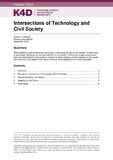| dc.contributor.author | Williams, Kirsten C. | |
| dc.date.accessioned | 2019-01-10T16:35:39Z | |
| dc.date.available | 2019-01-10T16:35:39Z | |
| dc.date.issued | 2018-09 | |
| dc.identifier.citation | Williams, Kirsten C. (2018). Intersections of Technology and Civil Society. K4D Helpdesk Report 448. Brighton, UK: Institute of Development Studies | en |
| dc.identifier.uri | https://opendocs.ids.ac.uk/opendocs/handle/20.500.12413/14252 | |
| dc.description.abstract | Technological developments of the last 30 years have revolutionized societies and democratised participation. The prospects for integrating more technological solutions to complex issues are growing while the role of civil society is shifting and in some cases diminishing. This report discusses how technology is disrupting civil society, especially with regard to disintermediation, and draws out what to anticipate about the future of civil society in the digital age. It reviews how technology has affected civil society, given the advent of disruptive innovation, new manifestations of civic engagement and the proliferation of new complex problems; identifies some of the ways in which civil society is experiencing disintermediation as a direct and indirect result of technology; and draws out some of the ways in which civil society might adapt to become more resilient towards the future. There is a wide body of academic literature on social innovation and Information Communication Technologies for Development (ICT4D). A smaller body of research exists around the evolution of civil society organisations, with only a few articles addressing disintermediation. The crossover between civil society and the digital revolution is only minimally explored and coverage of newer technologies and their implications for civil society is rare. Reports commissioned by large NGOs and think tanks discuss civic engagement, harnessing technology, digital policies and the frontiers of technology. The more frontier conversations at the nexus of civil society and technology are captured in expert blogs but are still speculative. Undoubtedly, there is a lack of sufficient empirical evidence. The novelty of technological advancements makes studying disruptive change difficult. Albeit the observations detailed in this rapid review, far more research is needed on how technology impacts the future of civil society. Although civil society loosely represents a group of formal and non-formal organisations/associations with diverse social interests beyond those of the public and private sectors, they are by no means a homogenous group. More nuanced research is needed to understand how different segments of civil society may be affected by technology. | en |
| dc.language.iso | en | en |
| dc.publisher | IDS | en |
| dc.relation.ispartofseries | K4D Helpdesk Report;448 | |
| dc.rights.uri | https://www.nationalarchives.gov.uk/doc/open-government-licence/version/3/ | en |
| dc.subject | Participation | en |
| dc.subject | Social Protection | en |
| dc.subject | Technology | en |
| dc.title | Intersections of Technology and Civil Society | en |
| dc.type | Other | en |
| dc.rights.holder | © DFID - Crown copyright 2018. | en |
| dcterms.dateAccepted | 2018-09 | |
| rioxxterms.funder | Department for International Development, UK Government | en |
| rioxxterms.identifier.project | K4D | en |
| rioxxterms.version | VoR | en |
| rioxxterms.funder.project | 238a9fa4-fe4a-4380-996b-995f33607ba0 | en |

